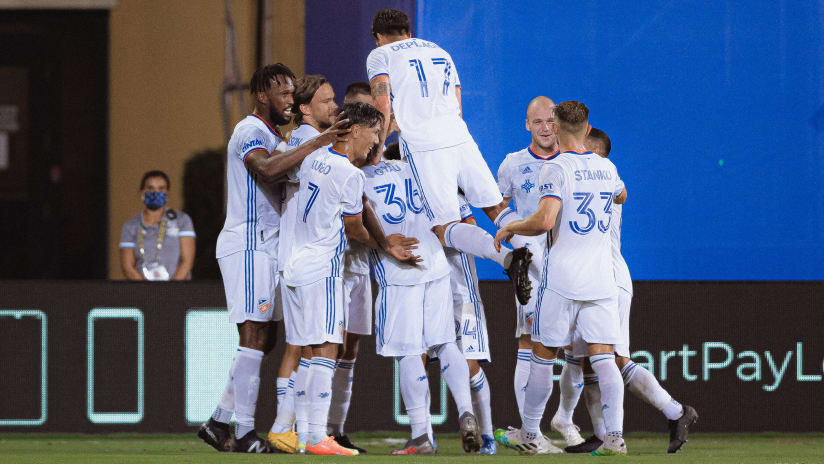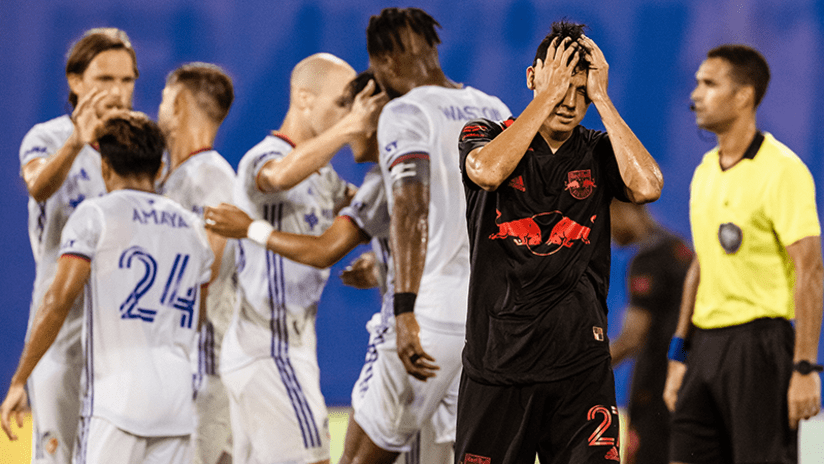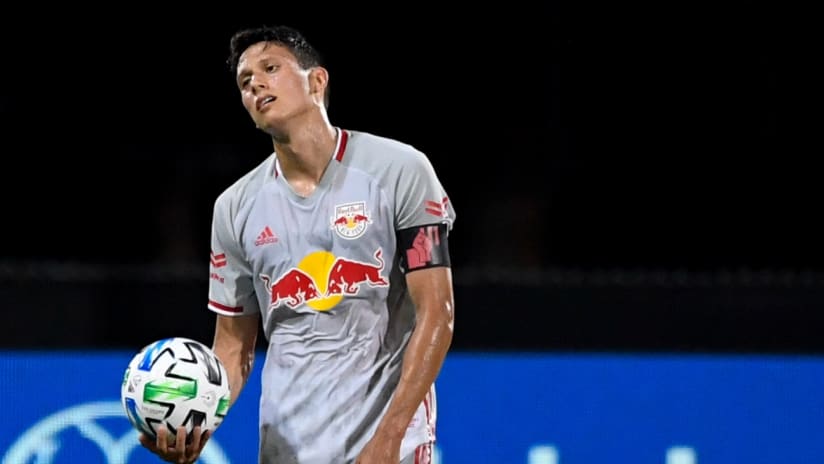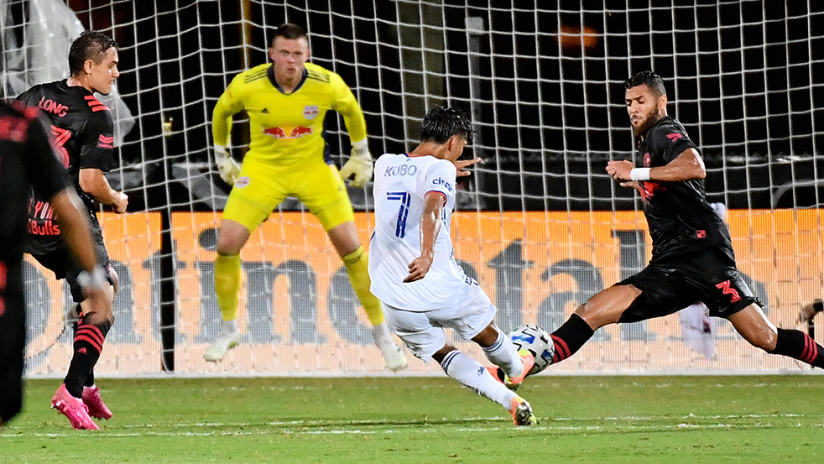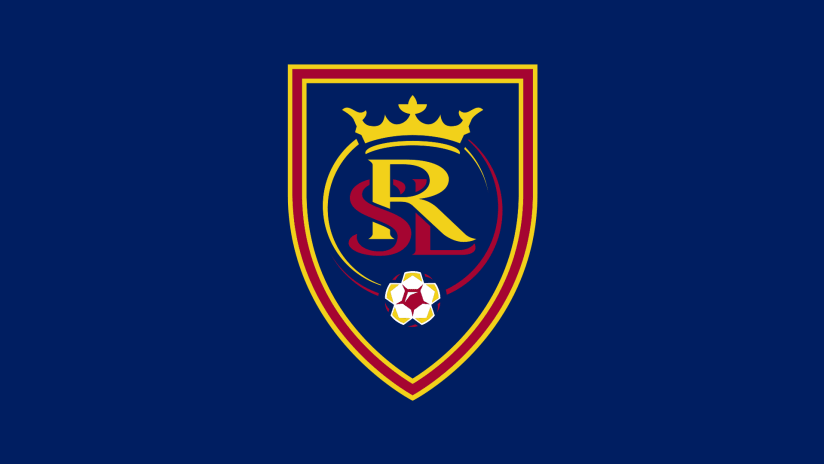The style that FC Cincinnati used to beat the New York Red Bulls, ensuring their best ever week in MLS after the win against Atlanta United, and sending the Red Bulls out of the tournament, isn’t a style that can be described as exciting or pleasing. Such a defensive style, which sets out simply to keep the other team from scoring and relegates attacking play to a hopeful toss of the dice with two or three attackers each time, is normally described as boring and anti-football (or anti-soccer).
But while the style may not be the most aesthetically impressive, what Cincinnati achieved was. They managed to not only survive but to succeed through a fascinating effort of faith.
Cincinnati as a team had to make a decision on what they wanted to be after the first match of this tournament, a 4-0 loss to Columbus Crew. Trying to play an open and attacking style led to embarrassment against their biggest rivals, so it was either they continue down that path in hopes that it will lead to success, or reckon with their limits and work from within those limitations. Jaap Stam and his men went with the second option. The choice immediately led to arguably the biggest victory in their history, against 2018 MLS Cup champs Atlanta.
I call such an act of concession and admission of a team’s weaker nature an effort of faith because while each style of soccer needs trust and confidence from and between teammates and coach, the type of defending that Stam has asked his players to do pushes for a much higher level of that confidence and trust. It asks for the players to give up so much of their natural inclinations and hopes for the greater good. A super defensive style is almost self-destructive by allowing the team to come under constant attack. It’s a very delicate tactic, which can only be successful through an intense focus and incredible work rate that’s underlined by a collective belief.
An outright defensive style asks the attackers to no longer attack, or at least for them to become auxiliary defenders and only attack as sparingly as possible. It asks the midfielders to become workhorses, to shuffle from side to side, closing down and tackling any would-be threat and blocking potential passing lanes. It demands from the defenders an incredible amount of concentration.
All these different types of players also have to work as one defensive body, constantly covering for each other, rotating in and out of positions, because mistakes will happen, threats will come, but the point is to make sure that there are at least one or two contingency places in place when those mistakes occur. Then there’s the goalkeeper, who must be on high alert in a way that even the best of them usually isn't — required to be tuned in for the full 90 minutes with no break as his the team actively invites pressure.
Highlights: FC Cincinnati vs. New York Red Bulls
In such a style, each individual has to transcend themselves, has to give up their desires and suppress their frustrations for the benefit of the team. It’s not a simple thing, and fans tend to underestimate how difficult it is to convince professional players, who are as egotistical as they come, to accept that they are not as good as their opponents and then to play to that knowledge. The wonderful thing about such an effort of faith is that it will be the building block after this tournament for Stam to develop whatever attacking philosophy that he wants to afterward.
"From that [Columbus] loss we spoke about it, trained a little bit different in the system we need to play," Stam said in his post-match press conference. "What’s for now the best way to play that gives us a little bit of success and gives us confidence and then we can start building from there and that’s what we’re trying to do."
While an effort of faith, it’s also one of luck. The players and managers have to believe that it will work, but because of how risky such a tactic is, there’s also a great deal of fortune that goes into that success. Though the team takes away the best attacking options for their opponents, soccer is a game where the ridiculous is also commonplace.
All it would take would be for a penalty in the dying minutes to be conceded, a long-range shot to go in, or a fluke deflection goal, and a loss after defending for most of the game, for the doubts to creep in with the players. Especially in a tournament where a loss or two could be fatal. Cincinnati managed to ride that luck in the last two games.
But there is another element to such a performance. The defensive style might not be entertaining, but what Cincinnati did is heroic. A team deciding to defend for most of the game and scoring from rare chances, would be condemnable if the team had the capacity to be better. It would become reductive. Cincinnati doesn’t right now. At least not with a brand new coach and against the opponents they have faced so far. But heroic stories aren’t always about an individual or group exceeding themselves to achieve a goal. Sometimes they have to go in the opposite direction.
Sometimes what is heroic is a team recognizing what is possible for them, and instead of fatally trying to be more, they accept their reality and do what is necessary. Stam asked his players to fight for and have faith in each other, to hassle the opposing players, prevent clear chances and then take whatever opportunities the game grants them on the other end.
It wasn’t pretty, but it was intelligent. It wasn’t what is seen as entertaining soccer, but it has led to the best success in Cincinnati’s short history. For a team that needed some success, something to believe in, these last two games and progression to the knockout stages, their effort of faith, has given them and their fans happiness and a path forward.

